高中英语词语辨析(十三)
常用英语词语用法辨析
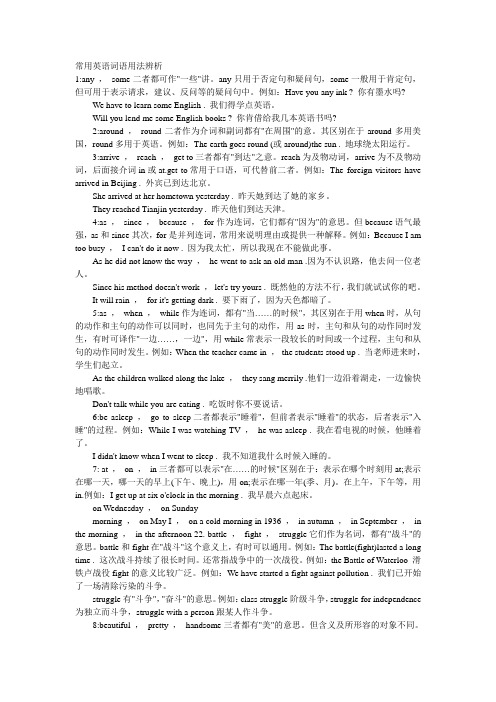
常用英语词语用法辨析1:any ,some二者都可作"一些"讲。
any只用于否定句和疑问句,some一般用于肯定句,但可用于表示请求,建议、反问等的疑问句中。
例如:Have you any ink ? 你有墨水吗?We have to learn some English . 我们得学点英语。
Will you lend me some English books ? 你肯借给我几本英语书吗?2:around ,round二者作为介词和副词都有"在周围"的意。
其区别在于around多用美国,round多用于英语。
例如:The earth goes round (或around)the sun . 地球绕太阳运行。
3:arrive ,reach ,get to三者都有"到达"之意。
reach为及物动词,arrive为不及物动词,后面接介词in或at.get to常用于口语,可代替前二者。
例如:The foreign visitors have arrived in Beijing . 外宾已到达北京。
She arrived at her hometown yesterday . 昨天她到达了她的家乡。
They reached Tianjin yesterday . 昨天他们到达天津。
4:as ,since ,because ,for作为连词,它们都有"因为"的意思。
但because语气最强,as和since其次,for是并列连词,常用来说明理由或提供一种解释。
例如:Because I am too busy ,I can't do it now . 因为我太忙,所以我现在不能做此事。
As he did not know the way ,he went to ask an old man .因为不认识路,他去问一位老人。
高中英语高考复习易混词辨析(共157组)

高考英语易混词辨析1.forgettable易被忘记的forgetful健忘的2.valueless无价值的invaluable非常贵重的3.economic有关经济的economical省钱的4.creation创造creativity创造力5.physician内科医生physicist物理学家6.comparable比得上的comparative相对的7.ashamed感到羞耻的/惭愧的shameful可耻的8.confident有信心的confidential秘密的9.disability缺陷,障碍inability无能,不能10.objection反对objectivity客观性11.worthless不值钱的priceless无价的12.impress留下印象impressive令人赞叹的13.response反应,回应responsible负责任的14.faith信心faithful忠诚的15.respect尊敬respective各自的,分别的16.occasion场合occasional偶尔的17.title标题entitle给予……权利18.reward奖励rewarding值得做的,高酬的19.found建立foundation基础,基金会20.drama戏剧dramatic突然的,戏剧般的21.trick花招tricky难对付的22.promise答应,预示promising有前途的23.invite邀请,招致inviting诱人的24.affect (v.)影响affection慈爱25.creation创造recreation娱乐26.promise许诺compromise妥协,让步27.temporary暂时的contemporary当代的28.present礼物;目前的represent代表29.strict严格的restrict限制30.science科学conscience良心31.knowledge知识acknowledge承认32.allow允许allowance津贴33.bowl碗bowling保龄球运动34.instant瞬间instance例子35.search搜查research研究36.sweat汗水,出汗sweet 甜的sweater毛衣37.appointment任命,约定disappointment失望38.stock股票,库存stocking长筒袜39.short短的shortly不久40.inform通知informal非正式的十二、易混词辨析41.easy容易的uneasy不安的;焦虑的41.ensure保证insure投保assure向……保证42.submit提交summit峰会,山峰43.initial最初的essential必不可少的44.contest竞赛context上下文45.pray祈祷spray喷射46.construct建造(v.) instruct指导,指令(v.)47.watch手表,观看match比赛48.succeed成功(v.) success成功(n.)49.image图形,形象,声誉imagine想象50.royal皇室的,高贵的loyal忠诚的51.steal偷steel钢52.access通道assess评价53.pocket口袋packet包54.relieve缓解believe相信55.relief宽慰belief信仰56.bridge桥fridge冰箱57.award奖品reward奖赏58.previous先前的precious宝贵的59.incident事件accident意外60.population人口pollution污染61.invent发明(v.)invest投资(v.)62.respond to对……做出回应correspond to与……一致63.statue雕像status地位,声誉64.source来源resource资源65.surrounding周围的(adj.) surroundings周围环境(n.)66.cure治愈curse诅咒67.sympathy同情(n.) symphony交响曲68.floor地板flour面粉69.college学院colleague同事70.design设计resign辞职71.medal勋章model模型,模特72.elect选举,推选select选择73.patent专利patient病人;有耐心的74.metal金属mental精神上的75.attitude态度altitude海拔76.desert沙漠,遗弃(v.) dessert甜点77.director负责人directory名录78.composition作文,作曲competition比赛79.together一起altogether总共80.consumption消费assumption假设81.apartment公寓套房department部门,大学的系、科82.institution协会constitution宪法,构造83.wonder奇迹,想知道(v.) wander闲逛,徘徊84.explain解释complain投诉,埋怨85.critic批评家critical批评的,至关重要的86.lesson课,教训lessen减少87.band乐队brand品牌,商标88.addition加,增加物addiction入迷,瘾89.import进口export出口90.adapt适应adopt采纳,收养91.tune调子,旋律tone腔调,音调,色调,风格92.section部分,部门,分支session会议,学期93.distribute分配,分发contribute做贡献,促成94.soup汤soap肥皂95.region地区religion宗教96.mount山峰;攀登(v.)amount数量97.personnel人事personal个人的98.nature自然mature (谷物、时机)成熟的99.headline标题deadline截止日期100.leather皮革feather羽毛101.describe描述subscribe订阅,同意102.cease停止tease取笑103.eagle鹰angel 天使angle角度104.contact接触contract合同105.evaluation评价evolution进化106.tension紧张extension延伸,扩大107.distance距离instance例子108.point指向;点appoint任命109.construction建造destruction毁坏120.constitute构成,组成(vt.) substitute替代物;替代(v.)121.tough 坚硬的,棘手的rough粗糙的,粗野的,天气恶劣的122.scare吓唬scarce罕见的,缺乏的123.passage短文,走廊,通道passenger乘客124.include包括(vt.)exclude不包括,排斥(vt.)125.enquire询问acquire获得126.cover覆盖,报道uncover移去盖子recover康复discover发现127.though尽管thought思考through穿过thorough彻底的128.late晚的lately最近later后来 latter后者latest最新的129.deserve值得preserve保护conserve保护reserve保护区;预定(v.)130.broad宽阔的board板;董事会abroad在海外 aboard在飞机/汽车/轮船上131.except除了expect期望respect尊敬inspect视察132.live adj.现场直播的,活的living adj.活着的;健在的,在使用的alive adj.活着的,有活力的lively adj.生气勃勃的133.sensible adj明智的,合理的sensitive adj.敏感的,灵敏的,体贴的134.special adj.特别的,专用的particular adj.专指的,格外的specific adj.明确的,特定的135.effective adj.有效的,实际的efficient adj.效率高的137.rough adj.粗糙的,粗略的,粗暴的tough adj.艰难的,坚强的138.continual adj.连续的,频繁的continuous adj.连续的(指从不间断的) 139.considerable adj.相当多(或大、重要等)的considerate adj.体谅的,考虑周到的140.respectable adj.值得尊敬的,相当好的respectful adj.尊敬的,表示敬意的respected adj.受尊敬的respective adj.分别的,各自的141.likely adj.可能的likable adj.可爱的dislike v.不喜欢alike adj.相似的unlike adj.不同的142.quantity n.数量quality n.质量143.camp n.宿营champion n.冠军campaign n.运动campus n.(大学、学院的)校园144.bank n.银行,库,河畔band n.乐队bond n.关系brand n.品牌145.ash n.灰烬cash n.现金146.sigh v.& n.叹气signal n.信号 v.发信号,表明sign n.标志,迹象v.签署147.flight n.航班,飞行fright n.害怕frighten v.使惊吓fight v.&n.打架,打仗148.advance v.& n.前进,进步adventure n.冒险advantage n.优点149.biology n.生物,生物学biography n.传记150.lie→lay→lain→lying躺,位于lie→lied→lied→lying撒谎lay→laid→laid→laying下(蛋),产(卵),安放,搁delay→delayed→delayed→delaying推迟151.star n.星stare v.凝视starve v.(使)挨饿152.explain v.解释complain v.抱怨plain n.平原adj.平凡的,极普通的153.offend v.冒犯defend v.防御154.rise v.上升raise v.提升,饲养arise v.产生praise v.表扬arouse v.激起155.amaze v.使惊奇amuse v.(使)娱乐156.attract v.吸引attack v.攻击157.effect n.影响affect v.影响(主要指一时的影响,着重影响的动作,可指一般意义的影响,也可指不良影响) influence v.& n.影响(主要指对行为、性格、观点等产生间接的或潜移默化的影响)。
高中英语单词辨析(整理)1
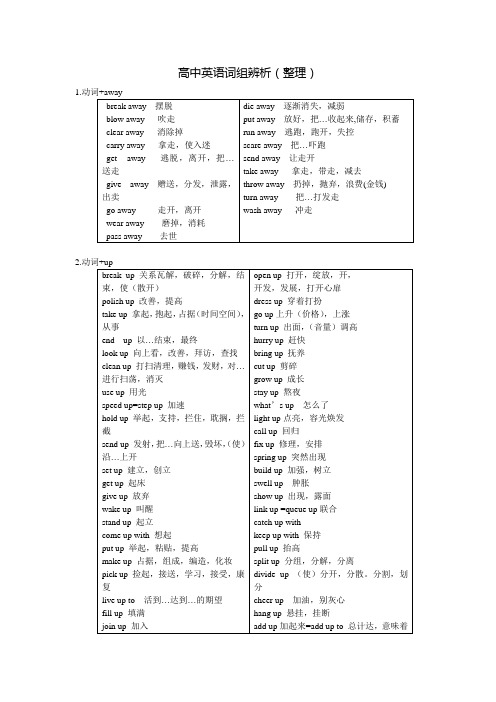
高中英语词组辨析(整理)1.2.3.ifif ready 如果准备好if so 如果这样的话if not 如果不是这样的话if necessary 如果有必要的话if possible 如果有可能的话if any 如果有…的话if only 要是…的就好if ever 极少,难得4.thanrather than 而不是other than 除了more than 多余…不仅仅是less than 少于worse than 比…更差5.6.Timein no time 立刻at one time 曾经at no time 绝不at a time 一次the first | next time …相当于连词,后接句子for the first time 第一次,相当于副词It /This is the first /second…time that sb has/have done sth.was had done sth.It’s time that sb did sth.7.8.禁止forbid somebody from doing sth.discourage sb. from doing sth.prevent sb. from doing sth.keep sb. from doing sth .stop sb. from doing sth.9.Setbe set in 以…为背景set out / off for sp. 动身去某地set sail for sp. 起航去某地set out to do sth. =set about doing sth .着手做某事set off 出发,引发,燃放set up 创立,建立set down =put /write/take down 写下,记录下set aside 省出,留出,把…放在一边set the table =lay the table 摆放餐具,准备吃饭10.Breakbreak out 战争爆发break in 插话,闯入break up (关系)破裂break off 打断,中断break through 突破break down 机器坏了,精神奔溃break away 脱离11.Taketake on 呈现,雇佣take after sb. 在(长相或性格)像某人take back 收回前言take down 记下,取下take in 理解,吸收,欺骗,将衣服改小take off 脱下,起飞,(事业)成功take over 接受,接管take up 继续,占据,开始从事某事take into 把…带入take away 带走take place 发生take apart 拆卸take part in 参加13.Cutcut back on 削减,减缩cut across 抄近路通过cut away 切除cut in 插嘴cut off 切断cut down 砍到,削减cut up 切碎cut out 去除cut after 追赶cut short 使…忽然停止,中断,打断16.Try 相关的短语try on 试穿,试验try out 试用,试验try out for 参加…的选拔try sth. on 在某人/某物上试某物try to do sth. 努力…try doing sth. 尝试…try one’s best 尽最大努力have a try 尝试18.Loselose heart 灰心lose one’s heart to 喜欢…lose face 丢脸lose weigh 减肥lose faith in 对…失去信心lose touch with sb. 失去与某人的联系lose one’s way 迷路lose one’s life 丧生lose one’s job 失业19.表“因为”的短语as a result /consequence ofbecause ofthanks todue toon account ofowing to20.与leave 有关的短语leave for 离开去…leave sb. with sth. 给某人留下…leave out 删除,省略leave behind 遗忘,使…落后leave word 留言leave aside 搁置,不考虑leave alone 更不用说leave behind 把…抛在后面,离开leave off 遗漏,停止(leave off doing sth.)leave over 剩下,推迟21.与“set”有关的短语22.“与…有关联”的相关短语be associated withbe connected withbe related withbe linked tohaving something to do with23.与24.忙于做某事be engaged inbe absorbed inbe buried inbe addicted ine into force/effect/view/existence掌权,生效,近在眼前,出现26.与“bring”相关的短语bring sb. to do 使某人做…bring sb. doing 引来某人做…bring about 带来,造成bring down 达到,降低bring forward 提出bring in 收(庄稼),引来,引进,挣得,生产,出产bring out 使显出,使…明白的显现出来bring up 教育,抚养,呕吐27.29.show 的相关短语for show 为着外衣,为装门面on show 在展出show sb. around 领某人参观…show sb. in/out 领某人进来/进去show off 炫耀,卖弄show oneself 出现,现身show up 出席,露面,使…突出,显眼30.与“give”有关的短语give one’s life to 把生命奉献给…give away 赠送,泄露give in (to sb )屈服,让步(于…)give off 发出(光,烟,气味等)give out 发出…分发,用尽,筋疲力尽give over to 支付…把…托付给give up 放弃give way (to)让步,给…让路give back31.32.33.34.shut 有关的短语shut in 围绕shut away 把…隔绝shut down 牢牢的把…关上,关闭(厂,店等),(雾,黑暗)笼罩shut off 关掉(水,煤气,电等),遮挡,切断(交通,道路)shut out 不让…进入,遮挡住shut up 闭嘴,紧紧关上35.与“sight”有关的短语at first sight 乍一看,第一眼就…at (the)sight of 一看见…catch sight 看见…发现…in sight 在视野围之,看得见…out of sight 看不见的lose sight of 看不见,忽略37.All有关的短语above all首先,首要after all 毕竟all along 一直,始终all in all 总体来说all over 浑身,到处at all 根本(用于否定句和条件句)in all 总计,共计38.含有“have”的短语have nothing /sth.in common with 与…有共同之处have the talent to do sth.(abilty )=have a talent /gift for 有做…的天赋have trouble /difficulty (in)doing sth.做某事有困难have sb. do/doing have sth. donehave no choice but to do 做…别无选择,只能…have affection for 喜欢have an effect on 对…有影响have a vivid memory of 对…有清晰的印象39.let 的相关短语let alone 不打扰,不惊动,更别提let down 放下,使失望,不支持let in 让…进入let out 放出,发出,泄露let go (of)松手,放弃let off 排放40.call有关的短语call for help 大声呼救make/pay a call on 拜访…make/give a call to 给..打call for 需要邀约call after 以某人的名字为…命名call in 召来,请来call on/upon (专程)拜访某人,号召,指派call out 大声叫,召集call up 打,使….想起call at sp.(专程)拜访某地41.keep 相关的短语keep doing 继续做keep sb.doing 使某人做keep sth. done 使…被…keep from doing 避免做…keep sb. from doing阻止keep away 避开,使远离keep back 后退,使后退,抑制keep out 不进去,使留在外面keep up (with)跟上,不落后43.把…看做…,把….视为…把…当做look on/upon as…regard …as/to be …recognize …as…treat …as…think …as…. Cider sb./sth. to be /as…think …to be see …as …view…as..44.就某人而言from the point of view of sb. fom one’s point of viewin one’s opinionas far as sb. be concerned on a personal note personallyas to mein my view45.“决不”的几种形式by no meansin no case/in no way under no circumstances on no caseat no timeon no consideration46.离开前往某地make one’s way tobe off tohead forleave fordepart forset off for47.处理,解决see todeal with/do with handlesolvesettlecope withfix48.有能力做…have ability to do sth.be able to do sth.be capable of doing sth. be competent to do sth.50.与“thought”有关的短语give though to 思考be lost in thought 陷入沉思without thought 不假思索have thought of 有…的想法on second thought 转念一想read one’s thoughts 看懂某人的心思51.对…满意be happy/pleased/satisfied/content withbe content to do sth.做…感到高兴52.与“reach ”相关The beggar reached out his hands for money 伸出(手)beyond(above ,out of )one ‘s hands 达不到的,力所不能及的,不能理解的make a reach for (sb./sth.)生出手,企图抓住…within easy reach of 在容易达到…的地方,在…的附近within one’s reach在某人力所能及的围,在某人能达到的围reach for 生出手去抓住reach a conclusion 得出一个结论reach their destination 达到他们的目的地reach sb. by telephone 通过找到/联系某人reach to the back of the classroom 传到教室的后面。
高中英语词语辨析empty,vacant,hollow
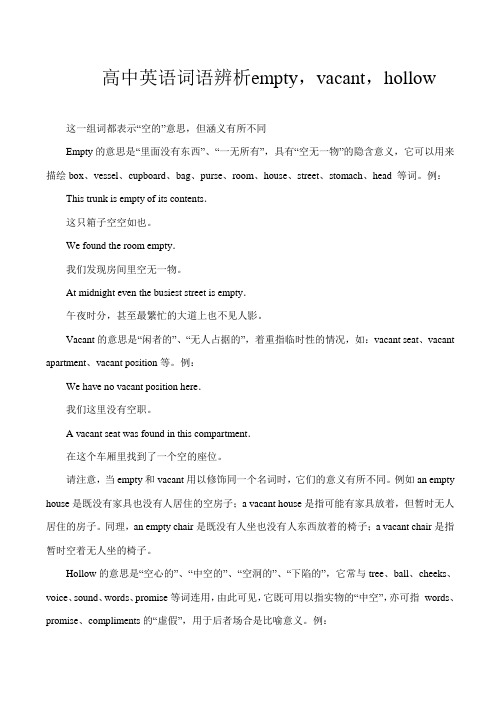
高中英语词语辨析empty,vacant,hollow这一组词都表示“空的”意思,但涵义有所不同Empty的意思是“里面没有东西”、“一无所有”,具有“空无一物”的隐含意义,它可以用来描绘box、vessel、cupboard、bag、purse、room、house、street、stomach、head 等词。
例:This trunk is empty of its contents.这只箱子空空如也。
We found the room empty.我们发现房间里空无一物。
At midnight even the busiest street is empty.午夜时分,甚至最繁忙的大道上也不见人影。
Vacant的意思是“闲者的”、“无人占据的”,着重指临时性的情况,如:vacant seat、vacant apartment、vacant position等。
例:We have no vacant position here.我们这里没有空职。
A vacant seat was found in this compartment.在这个车厢里找到了一个空的座位。
请注意,当empty和vacant用以修饰同一个名词时,它们的意义有所不同。
例如an empty house是既没有家具也没有人居住的空房子;a vacant house是指可能有家具放着,但暂时无人居住的房子。
同理,an empty chair是既没有人坐也没有人东西放着的椅子;a vacant chair是指暂时空着无人坐的椅子。
Hollow的意思是“空心的”、“中空的”、“空洞的”、“下陷的”,它常与tree、ball、cheeks、voice、sound、words、promise等词连用,由此可见,它既可用以指实物的“中空”,亦可指words、promise、compliments的“虚假”,用于后者场合是比喻意义。
例:This is a hollow tree.这是一棵中空的树。
高中英语语法知识汇总之词语辨析整理
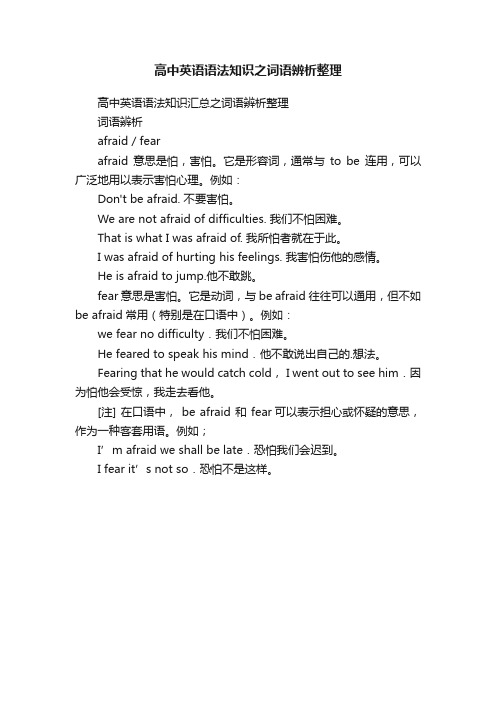
高中英语语法知识之词语辨析整理
高中英语语法知识汇总之词语辨析整理
词语辨析
afraid / fear
afraid 意思是怕,害怕。
它是形容词,通常与to be连用,可以广泛地用以表示害怕心理。
例如:
Don't be afraid. 不要害怕。
We are not afraid of difficulties. 我们不怕困难。
That is what I was afraid of. 我所怕者就在于此。
I was afraid of hurting his feelings. 我害怕伤他的感情。
He is afraid to jump.他不敢跳。
fear 意思是害怕。
它是动词,与be afraid往往可以通用,但不如be afraid常用(特别是在口语中)。
例如:
we fear no difficulty.我们不怕困难。
He feared to speak his mind.他不敢说出自己的.想法。
Fearing that he would catch cold, I went out to see him.因为怕他会受惊,我走去看他。
[注] 在口语中, be afraid 和 fear可以表示担心或怀疑的意思,作为一种客套用语。
例如;
I’m afraid we shall be late.恐怕我们会迟到。
I fear it’s not so.恐怕不是这样。
150高中词汇辨析
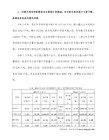
make up one's mind 意为“下定决心”
如:He made up his mind not to speak a word.他下定决心不说一句话。
read one's mind 意为“看出心事,知道在想什么”
如:He is a dangerous man.他是一个危险人物。
in danger 意为“处于危险中”,指句子主语的处境。
如:He is in danger of losing his job.他处于失业的危险中。
21.reach, reach for
reach 意为“够得到”,表结果
I don't understand in the least what he is trying to say.我一点都不明白他在说些什么。
5.even if, even though
二者均意为“即使,尽管”,大部分情况下可通用,但是也有一点小的区别。
如:Even if he is poor, she loves him.(He may be poor.) even if侧重假设
150组常见高考英语词语辨析
1.a bit, a little
a bit 和a little的用法类似,都可修饰形容词原形和比较级。
如:I'm a bit/little tired.
I'm a bit/little better now.
但是如接名词,a bit后要加of, 而a little不用
如:It has been decided that museum shall not be open on Saturday.经决定博物馆星期六不开放。
北师大版高中英语必修五第1讲:Unit13 people-词汇篇1(教师版)
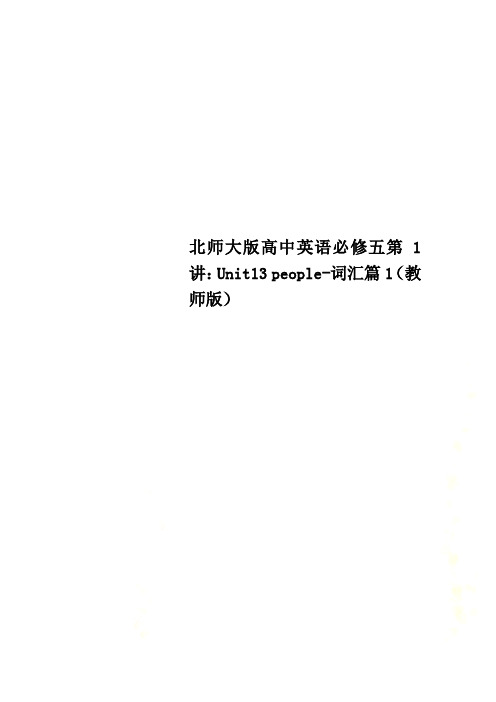
北师大版高中英语必修五第1讲:Unit13 people-词汇篇1(教师版)这歌手越来越受到人们的欢迎。
(3)(钟、表等)走快【典型例句】We gained experience by working during the summer.我们从暑期的工作中获得了经验.Students gain knowledge by reading.学生们通过阅读增加知识。
We gained our destination before dark.我们天黑之前到达了目的地。
My watch gains five minutes a day.我的表一天快五分钟。
2. concentrate vi.&vt.集中(注意力、思想等)集中于某处;使集中于一点【精讲拓展】concentrate on/uponconcentrate one’s attention onconcentration n.【典型例句】We must concentrate our attention on efficiency.我们必须把注意力集中在效率上。
For centuries the population of Europe has been concentrated in large cities.几个世纪以来,欧洲的人口一直集中在大城市里。
It’s hard to concentrate on writing a letter with the TV on.开着电视机很难集中精力写信。
Concentration is essential if you want to do a good job.如果你想把事情做好,专心是必要的。
3. connect vt.&vi.连接;结合;连结,接通电话,(与with连用)有联系,有关搭配:connect with /to;connection n.be connected to/with/by【典型例句】This railway connects London and Edinburgh.这条铁路连接伦敦与爱丁堡。
高中英语词语辨析have and eye on,have an eye to,have an eye for
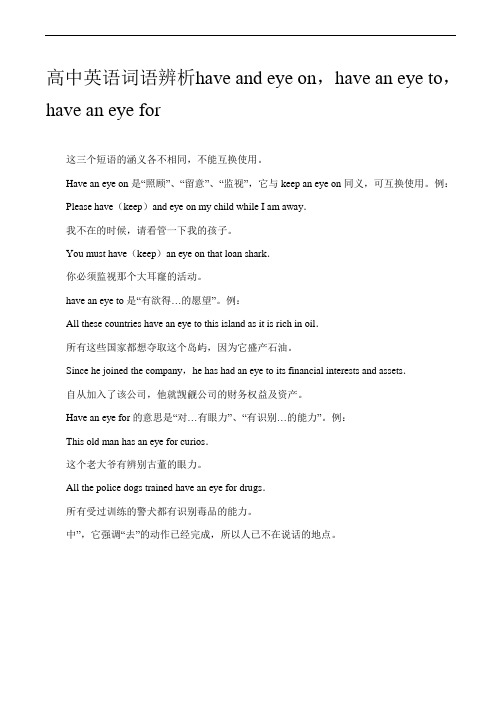
高中英语词语辨析have and eye on,have an eye to,have an eye for
这三个短语的涵义各不相同,不能互换使用。
Have an eye on是“照顾”、“留意”、“监视”,它与keep an eye on同义,可互换使用。
例:Please have(keep)and eye on my child while I am away.
我不在的时候,请看管一下我的孩子。
You must have(keep)an eye on that loan shark.
你必须监视那个大耳窿的活动。
have an eye to是“有欲得…的愿望”。
例:
All these countries have an eye to this island as it is rich in oil.
所有这些国家都想夺取这个岛屿,因为它盛产石油。
Since he joined the company,he has had an eye to its financial interests and assets.
自从加入了该公司,他就觊觎公司的财务权益及资产。
Have an eye for的意思是“对…有眼力”、“有识别…的能力”。
例:
This old man has an eye for curios.
这个老大爷有辨别古董的眼力。
All the police dogs trained have an eye for drugs.
所有受过训练的警犬都有识别毒品的能力。
中”,它强调“去”的动作已经完成,所以人已不在说话的地点。
高中英语词语辨析
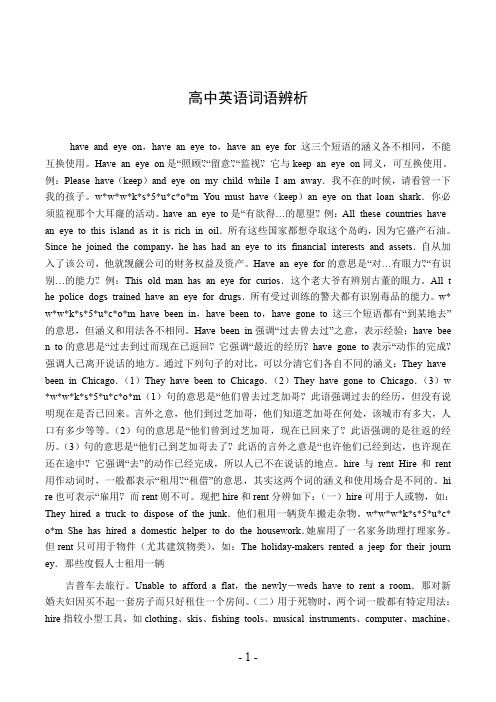
高中英语词语辨析have and eye on,have an eye to,have an eye for这三个短语的涵义各不相同,不能互换使用。
Have an eye on是“照顾”、“留意”、“监视”,它与keep an eye on同义,可互换使用。
例:Please have(keep)and eye on my child while I am away.我不在的时候,请看管一下我的孩子。
w*w*w*k*s*5*u*c*o*m You must have(keep)an eye on that loan shark.你必须监视那个大耳窿的活动。
have an eye to是“有欲得…的愿望”。
例:All these countries have an eye to this island as it is rich in oil.所有这些国家都想夺取这个岛屿,因为它盛产石油。
Since he joined the company,he has had an eye to its financial interests and assets.自从加入了该公司,他就觊觎公司的财务权益及资产。
Have an eye for的意思是“对…有眼力”、“有识别…的能力”。
例:This old man has an eye for curios.这个老大爷有辨别古董的眼力。
All t he police dogs trained have an eye for drugs.所有受过训练的警犬都有识别毒品的能力。
w* w*w*k*s*5*u*c*o*m have been in,have been to,have gone to这三个短语都有“到某地去”的意思,但涵义和用法各不相同。
Have been in强调“过去曾去过”之意,表示经验;have bee n to的意思是“过去到过而现在已返回”,它强调“最近的经历”;have gone to表示“动作的完成”,强调人已离开说话的地方。
常用高中英语词语辨析

常用高中英语词语辨析105组1.elder 与elderly两者都为“年老的”,但有细微的差别。
elderly 指中年与暮年之间的年龄,表示人已过中年,因此,这词常用来代替 old。
如:anelderly gentleman. 一位年长的绅士。
elder 指年龄稍长者,适用于家庭的兄弟姐妹之间。
如: Tom is the elder of the two. 汤姆是两个孩子中较大的一个。
2.precious 和 expensiveexpensive 表示“昂贵的”。
如:The drink was cheap , but the food was veryexpensive . 饮料很便宜,但食物很贵。
precious 表示“珍贵的,宝贵的”。
如:The children are precious to me . 孩子们对我来说很重要。
3.regret to do 和 regret doingregret doing 表示“做了某事而感到遗憾或后悔”,v-ing 动作发生在regret 之前。
如:Iregretted missing the train. 我为没有赶上火车而感到很懊恼。
regret to do 指“当时或现在遗憾地做什么”。
如:I regret to tell you that we can'tstay here any longer. 我遗憾地告诉你,我们不能在这儿多呆了。
4.day by day 和 day after day两词组意思很近,但有区别:day by day 只用作状语,表示“一天天地”,有逐渐转变的意思。
如:Day by day she seems to grow alittle taller.她似乎一天天地长高了。
day after day 可作主语,宾语等,亦可作状语,表示“一天又一天”,强调动作的重复,表示时间的长久。
如: We do the same work day afterday. 每天我们做着同样的事情。
最新高中英语词汇:常用英语词语辨析

最新高中英语词汇:常用英语词语辨析2017最新高中英语词汇:常用英语词语辨析高中英语词汇:常用英语词语辨析1.sure与certain两词都是表语性形容词,意为一定的,确实的(certain还可作定语),后接of/about,动词不定式和that引导的从句。
如:We are sure/certain of winning the game.我们确信会赢。
I'm not sure/certain about some of the English idioms.我对英语的某些成语没有把握。
We are sure/certain to win the game.我们一定会赢得比赛的胜利的。
She is sure/certain that his lecture will be warmly welcome.她确信他的讲座一定会受到热烈欢迎。
certain可以用于It is certain that…句式中,而sure则不可以。
如:It is certain(此处不能用sure) that the project will be a success.工程会成功,这是确定无疑的。
2.spend, pay与cost三词都作花费金钱解,差异如下:①spend与pay必须由人来作主语,而cost却由物(即it)来作主语,如:He has spent all his money on books.他把全部的钱都买了书。
During the next ten years we both worked night and day to pay for it.为了还债,10年来我们俩夜以继日地干活。
What will it cost me? It will cost you 20 dollars.这要花我多少钱?要花你20元钱。
②spend与pay搭的介词不一样,前者常与on连用,后者常与for连用。
而cost的花费,可以是金钱,还可是时间、精力或劳力等。
高中英语词语辨析fairly, quite, rather, very, pretty
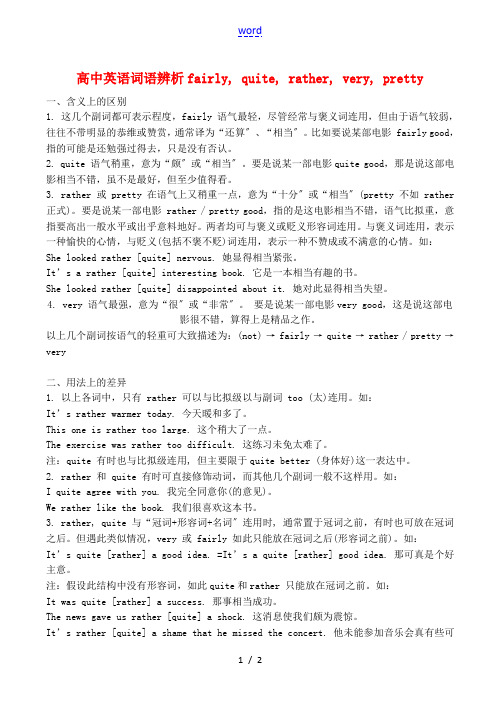
高中英语词语辨析fairly, quite, rather, very, pretty一、含义上的区别1. 这几个副词都可表示程度,fairly 语气最轻,尽管经常与褒义词连用,但由于语气较弱,往往不带明显的恭维或赞赏,通常译为“还算〞、“相当〞。
比如要说某部电影 fairly good,指的可能是还勉强过得去,只是没有否认。
2. quite 语气稍重,意为“颇〞或“相当〞。
要是说某一部电影quite good,那是说这部电影相当不错,虽不是最好,但至少值得看。
3. rather 或 pretty 在语气上又稍重一点,意为“十分〞或“相当〞(pretty 不如 rather 正式)。
要是说某一部电影 rather / pretty good,指的是这电影相当不错,语气比拟重,意指要高出一般水平或出乎意料地好。
两者均可与褒义或贬义形容词连用。
与褒义词连用,表示一种愉快的心情,与贬义(包括不褒不贬)词连用,表示一种不赞成或不满意的心情。
如:She looked rather [quite] nervous. 她显得相当紧张。
It’s a rather [quite] interesting book.它是一本相当有趣的书。
She looked rather [quite] disappointed about it. 她对此显得相当失望。
4. very 语气最强,意为“很〞或“非常〞。
要是说某一部电影very good,这是说这部电影很不错,算得上是精品之作。
以上几个副词按语气的轻重可大致描述为:(not) → fairly → quite → rather / pretty → very二、用法上的差异1. 以上各词中,只有 rather 可以与比拟级以与副词 too (太)连用。
如:It’s rather warmer today. 今天暖和多了。
This one is rather too large. 这个稍大了一点。
高考英语重点词汇辨析—动词

动词部分1.accuse / chargeaccuse 和charge都有“指责,控告”之意,有时可通用,但结构不一样。
accuse不一定针对重大过失或罪行,其结构为accuse sb of sth。
而charge一般用于重大过失或罪行,其结构为charge sb with sth,此结构还有“使某人负有……责任”之意。
My father accused me of my being too careless. 父亲责备我太粗心。
He accused me of neglecting my duty. 他指控我玩忽职守。
He charged me with neglecting my duty. 他指控我玩忽职守。
Jimmy was charged with murder. 吉米被控谋杀。
He was charged with an important task. 他担负有一项重要任务。
2.add / add to / add up / add up toadd:增加,把……加上。
add…to…:把……加到。
At the end of the party, we added another program.You needn’t add any water to the medicine.add to:增添。
指增添喜悦、悲伤、麻烦等。
His coming added to our trouble. 他的到来给我们添了麻烦。
add up:加起来。
Have you added up all the numbers?add up to:总计。
表示加起来的结果,无被动结构。
All the numbers added up to 100.3.advise / suggestadvise:建议,劝说。
I advised (his) trying again. (= suggest)I advised that we (should) try again. (= suggest,虚拟语气。
高中英语导学 Unit13 The USA(附答案)

Unit 13 The USA一. 课文理解【背景介绍】1.按照时间顺序掌握纽约发展史:1524 An Italian explorer discovered these islands.1626 The island of Manhattan was bought from local Indians.1789~1790 New York was the capital of the USA after the War of Independence.By 1820 The population of New York had reached 125,000 and New York was the largest city in the USA.1858 The poor old buildings in an area were torn down and Central Park was created.1892 Large numbers of people began to move into America, who came from all corners of the earth.Around 1900 The skyscrapers began to appear.1913 A 55-storey building went up.1931 The Empire State Building was completed.Present Many taller buildings (except the World Trade Center after September 11, 2001) are in New York and New York is a very exciting place.2.预习The Bison On the Plains of America, 回答问题:(1)Who were the first settlers on the plains of America?(2)What did they live on?(3)When were the first horses brought to America?(4)What were the horses trained to do?(5)What is the bison?(6)What did the bison provide native Americans with?(7)Why were native Americans forced to move away from their old hunting grounds?(8)What did the settlers do after they took possession of the plains?(9)What did the settlers do to the bison?(10)What was the change of the bison population?(11)What happened after the bisons were killed in large numbers?(12)Who destroyed the whole wildlife chain of the plains?【答疑解惑】句子分析1.The first westerner to discover these islands was an Italian explorer in 1524.To discover these islands 不定式作定语修饰westerner. 不定式作定语放在所修饰的名词后面. 不定式作定语与所修饰的名词关系一般存在下类关系:He is always the first to come. (逻辑主谓关系)Would you like something to drink? (逻辑动宾关系)He has no room to live in. (逻辑上介词与宾语的关系)I have not any time to write the article. (逻辑上状语与动词的关系)2.Now that they could ride horses, it became easier to hunt the bison, a type of cattle whichused to exist in huge numbers on the plains of America.now that 引导原因状语从句, 译做“既然”. 有时只有now, 如:Now we are alone, we can speak freely.3.Between 1850 and 1910 the bison population is thought to have fallen from 60 million to just a few hundred.to have fallen 不定式做主语补足语. 不定式的完成式表示动作先于位于动词的发生. 如:I am sorry to have kept you waiting for a long time. ( to have kept 在谓语动词之前)十分抱歉让你等了这么久语言重点1.a handful of goods worth about $ 24.A handful of 一把,少量;修饰可数名词.Only a handful of people attended the dance ball. 仅有少量的人参加了舞会.Worth about $24形容词短语作定语, 放在所修饰的名词后面, 在此修饰goods. 例如:The cup full of tea is his. 装满茶水的杯子是他的.2.Today native Americans express their anger over this business deal.Over (介词)表示在某问题之上,为某事, 对某事. 例如:They quarrelled over the price of the food. 他们对食品的价格而争吵.3.People who wanted to enter the USA had to go through a number of mental and physical tests, and about 2 million people were turned away.turn away 撵走, 拒不接纳. 例如:Because the hall was full, and many people were turned away.由于大厅人满了, 许多人被拒之门外.4.They lived by hunting and by gathering roots, nuts and wild fruits.live by 靠(手段, 方法)……维生. 例如:She lives by sewing for other families. 她靠为别人家庭做些缝纫活儿谋生.live on …/ feed on… 靠吃……而生活. 例如:We can’t live on air. 我们不能靠吃空气而生存。
高一英语词语辨析人教版知识精讲

高一英语词语辨析人教版【同步教育信息】一. 本周教学内容:词语辨析1. pick ⎪⎪⎪⎩⎪⎪⎪⎨⎧选择、分辨出、领会让人搭车获得不刻意站起来跌倒后拾起、捡起out )4()()3()()2()1(upeg .(1)He bent over to pick up his hat .(2)I picked him up on my way home .2. devote vt.(1)devote one’s abilities to 把自己的才干用在……上(2)devote one’s attention to 专注于……(3)devote oneself to 献身于……(4)devote one’s knowledge to 把自己的知识用于……eg .He devoted his lifetime to sicentific research .3.(1)die out 灭绝、逐渐消失(2)die off 相继死去(3)die of 死于内因(4)die from 死于外因eg .① The Indian tribes have now almost died out .② Mr Gaxton has died of a heart attack .③ The flowers are dying off because there has been no rain .4.⎪⎭⎪⎬⎫⎪⎩⎪⎨⎧++++++doing from prevent doing from stop )()(doing from keep 宾语宾语宾语阻止……做某事eg .The heavy rain time on arriving (from)us prevented (foom)us stopped foom us kep ⎪⎭⎪⎬⎫⎪⎩⎪⎨⎧+5. another pron. 又一个,再一个eg .(1)I don’t like this one , show me another .(2)adj. Here comes another bus .(3)another + 基数词 + 名词复数He stayed there of another three days .6. make sure / certain 一定要,保证做到,核实,弄清楚。
高中语法复习:动词词义辨析
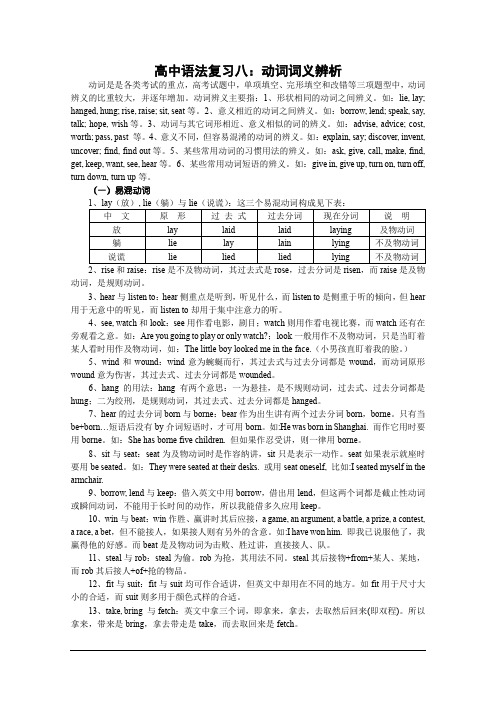
高中语法复习八:动词词义辨析动词是是各类考试的重点,高考试题中,单项填空、完形填空和改错等三项题型中,动词辨义的比重较大,并逐年增加。
动词辨义主要指:1、形状相同的动词之间辨义。
如:lie, lay; hanged, hung; rise, raise; sit, seat等。
2、意义相近的动词之间辨义。
如:borrow, lend; speak, say, talk; hope, wish等。
3、动词与其它词形相近、意义相似的词的辨义。
如:advise, advice; cost, worth; pass, past 等。
4、意义不同,但容易混淆的动词的辨义。
如:explain, say; discover, invent, uncover; find, find out等。
5、某些常用动词的习惯用法的辨义。
如:ask, give, call, make, find, get, keep, want, see, hear等。
6、某些常用动词短语的辨义。
如:give in, give up, turn on, turn off, turn down, turn up等。
(一)易混动词2、rise和raise:rise是不及物动词,其过去式是rose,过去分词是risen,而raise是及物动词,是规则动词。
3、hear与listen to:hear侧重点是听到,听见什么,而listen to是侧重于听的倾向,但hear 用于无意中的听见,而listen to却用于集中注意力的听。
4、see, watch和look:see用作看电影,剧目;watch则用作看电视比赛,而watch还有在旁观看之意。
如:Are you going to play or only watch?;look一般用作不及物动词,只是当盯着某人看时用作及物动词,如:The little boy looked me in the face.(小男孩直盯着我的脸。
高中英语单词辨析

高中英语词组辨析〔整理〕1.2.3.ifif ready 如果准备好if so 如果这样的话if not 如果不是这样的话if necessary 如果有必要的话if possible 如果有可能的话if any 如果有…的话if only 要是…的就好if ever 极少,难得4.thanrather than 而不是other than 除了more than 多余…不仅仅是less than 少于worse than 比…更差5.in no time 立刻at one time 曾经at no time 绝不at a time 一次the first | ne*t time …相当于连词,后接句子for the first time 第一次,相当于副词It /This is the first /second…time that sb has/have done sth.was had done sth. It’s time that sb did sth.7.8.forbid somebody from doing sth.discourage sb. from doing sth.prevent sb. from doing sth.keep sb. from doing sth .stop sb. from doing sth.9.Setbe set in 以…为背景set out / off for sp. 动身去*地set sail for sp. 起航去*地set out to do sth. =set about doing sth .着手做*事set off 出发,引发,燃放set up 创立,建立set down =put /write/take down 写下,记录下set aside 省出,留出,把…放在一边set the table =lay the table 摆放餐具,准备吃饭10.Breakbreak out 战争爆发break in 插话,闯入break up (关系)破裂break off 打断,中断break through 突破break down 机器坏了,精神奔溃break away 脱离11.Taketake on 呈现,雇佣take after sb. 在〔长相或性格〕像*人take back 收回前言take down 记下,取下take in 理解,吸收,欺骗,将衣服改小take off 脱下,起飞,〔事业〕成功take over 承受,接收take up 继续,占据,开场从事*事take into 把…带入take away 带走take place 发生take apart 拆卸take part in 参加cut back on 削减,减缩cut across 抄近路通过cut away 切除cut in 插嘴cut off 切断cut down 砍到,削减 cut up 切碎 cut out 去除 cut after 追赶cut short 使…突然停顿,中断,打断try on 试穿,试验 try out 试用,试验try out for 参加…的选拔try sth. on 在*人/*物上试*物 try to do sth. 努力… try doing sth. 尝试…try one ’s best 尽最大努力 have a try 尝试 lose heart 灰心lose one ’s heart to 喜欢… lose face 丢脸lose weigh 减肥lose faith in 对…失去信心lose touch with sb. 失去与*人的联系lose one’s way 迷路lose one’s life 丧生lose one’s job 失业19.表“因为〞的短语as a result /consequence ofbecause ofthanks todue toon account ofowing to20.与leave 有关的短语leave for 离开去…leave sb. with sth. 给*人留下…leave out 删除,省略leave behind 遗忘,使…落后leave word 留言leave aside 搁置,不考虑leave alone 更不用说leave behind 把…抛在后面,离开leave off 遗漏,停顿〔leave off doing sth.〕leave over 剩下,推迟21.22.be associated withbe connected withbe related withbe linked tohaving something to do with23.与24.be engaged inbe absorbed inbe buried inbe addicted in25.e into force/effect/view/e*istence掌权,生效,近在眼前,出现26.与“bring〞相关的短语bring sb. to do 使*人做…bring sb. doing 引来*人做…bring about 带来,造成bring down 到达,降低bring forward 提出bring in 收〔庄稼〕,引来,引进,挣得,生产,出产bring out 使显出,使…明白的显现出来bring up 教育,抚养,呕吐27.for show 为着外衣,为装门面on show 在展出show sb. around 领*人参观…show sb. in/out 领*人进来/进去show off 炫耀,卖弄show oneself 出现,现身show up 出席,露面,使…突出,显眼30.与“give〞有关的短语give one’s life to 把生命奉献给…give away 赠送,泄露give in 〔to sb 〕屈服,让步〔于…〕give off 发出〔光,烟,气味等〕give out 发出…分发,用尽,筋疲力尽give over to 支付…把…托付给give up 放弃give way 〔to〕让步,给…让路give back31.32.33.shut in 围绕shut away 把…隔绝shut down 牢牢的把…关上,关闭〔厂,店等〕,〔雾,黑暗〕笼罩shut off 关掉〔水,煤气,电等〕,遮挡,切断〔交通,道路〕shut out 不让…进入,遮挡住shut up 闭嘴,紧紧关上35.与“sight〞有关的短语at first sight 乍一看,第一眼就…at 〔the〕sight of 一看见…catch sight 看见…发现…in sight 在视野围之,看得见…out of sight 看不见的lose sight of 看不见,忽略above all首先,首要after all 毕竟all along 一直,始终all in all 总体来说all over 浑身,到处at all 根本〔用于否认句和条件句〕in all 总计,共计38.含有“have〞的短语have nothing /sth.in mon with 与…有共同之处have the talent to do sth.〔abilty 〕=have a talent /gift for 有做…的天赋have trouble /difficulty 〔in〕doing sth.做*事有困难have sb. do/doing have sth. donehave no choice but to do 做…别无选择,只能…have affection for 喜欢have an effect on 对…有影响have a vivid memory of 对…有清晰的印象39.let 的相关短语let alone 不打搅,不惊动,更别提let down 放下,使失望,不支持let in 让…进入let out 放出,发出,泄露let go 〔of〕松手,放弃let off 排放40.call有关的短语call for help 大声呼救make/pay a call on 拜访…make/give a call to 给..打call for 需要邀约call after 以*人的名字为…命名call in 召来,请来call on/upon 〔专程〕拜访*人,号召,指派call out 大声叫,召集call up 打,使….想起call at sp.(专程)拜访*地41.keep 相关的短语keep doing 继续做keep sb.doing 使*人做keep sth. done 使…被…keep from doing 防止做…keep sb. from doing阻止keep away 避开,使远离keep back 后退,使后退,抑制keep out 不进去,使留在外面keep up 〔with〕跟上,不落后look on/upon as…regard …as/to be …recognize …as…treat …as…think …as…. Cider sb./sth. to be /as…think …to be see …as …view…as..44.就*人而言from the point of view of sb. fom one’s point of viewin one’s opinionas far as sb. be concerned on a personal note personallyas to mein my view45.“决不〞的几种形式by no meansin no case/in no way under no circumstanceson no caseat no timeon no consideration46.离开前往*地make one’s way tobe off tohead forleave fordepart forset off for47.处理,解决see todeal with/do withhandlesolvesettlecope withfi*48.有能力做…have ability to do sth.be able to do sth.be capable of doing sth.be petent to do sth.give though to 思考be lost in thought 陷入沉思without thought 不假思索have thought of 有…的想法on second thought 转念一想read one’s thoughts 看懂*人的心思51.对…满意be happy/pleased/satisfied/content withbe content to do sth.做…感到快乐52.与“reach〞相关The beggar reached out his hands for money 伸出〔手〕beyond〔above ,out of 〕one ‘s hands 达不到的,力所不能及的,不能理解的make a reach for 〔sb./sth.〕生出手,企图抓住…within easy reach of 在容易到达…的地方,在…的附近within one’s reach在*人力所能及的围,在*人能到达的围reach for 生出手去抓住reach a conclusion 得出一个结论reach their destination 到达他们的目的地reach sb. by telephone 通过找到/联系*人reach to the back of the classroom 传到教室的后面。
高中英语词语辨析even,even though,though
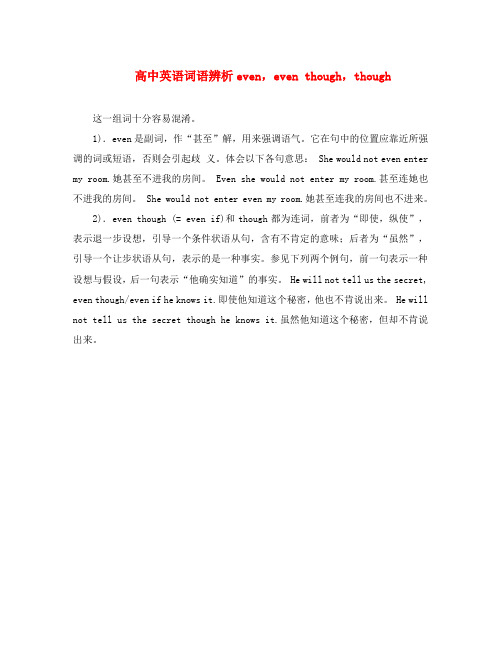
高中英语词语辨析even,even though,though
这一组词十分容易混淆。
1).even是副词,作“甚至”解,用来强调语气。
它在句中的位置应靠近所强调的词或短语,否则会引起歧义。
体会以下各句意思: She would not even enter my room.她甚至不进我的房间。
Even she would not enter my room.甚至连她也不进我的房间。
She would not enter even my room.她甚至连我的房间也不进来。
2).even though (= even if)和though都为连词,前者为“即使,纵使”,表示退一步设想,引导一个条件状语从句,含有不肯定的意味;后者为“虽然”,引导一个让步状语从句,表示的是一种事实。
参见下列两个例句,前一句表示一种设想与假设,后一句表示“他确实知道”的事实。
He will not tell us the secret, even though/even if he knows it.即使他知道这个秘密,他也不肯说出来。
He will not tell us the secret though he knows it.虽然他知道这个秘密,但却不肯说出来。
高中二册Units 11—12词语辨析
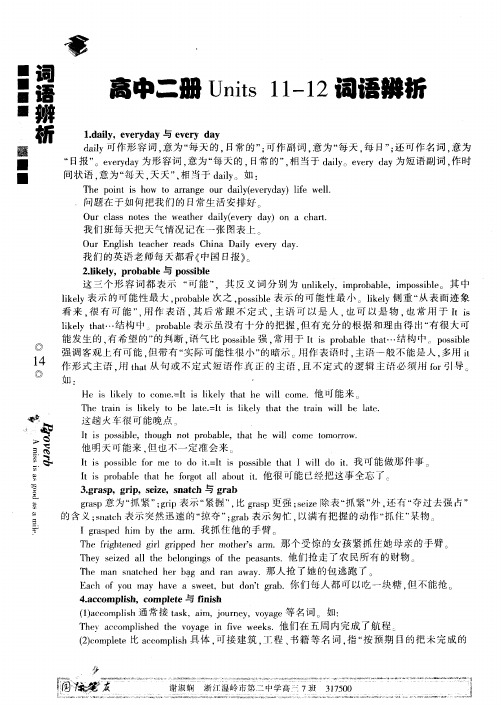
如!
・
H sl e o cm .I i l ey ta h i o e e i i l t o e=t s i l ht ew l c m .他 可 能 来 ky k l 、
T tan i lk l o e ae = t s ie y h t h r i wil e ae he r i s i e y t b lt . I i l l t a t e tan k l b lt .
这趟 火车很 可能 晚点 , 、
I s o sbl,t o g n t p o b e ha wi c me o ro t p si e h u h o r ba l ,t t he l o tmo r w. i l
他 明天 可能 来 . 但也 不一定 准会来 、 I i psil f e t d t I i p Sil ta 1w d t t s 0s e o m o 0 i=t s OS e h t Ⅲ o i b r . b .我可 能做那 件事 . . I i po a l ta h ro alao ti t s rbbe h t e f gt l b u t . j.已经把 这事全 忘 了 o .他很 z, - H - 匕 e
3g a p rp ez ,s ac .r s ,g i,sie n th与 g a rb
gap意为 “ 紧”gi rs 抓 ;r p表示 “ 紧握 ” 比 gap更 强 ;e e除表 “ 紧” , 有 “ , rs si z 抓 外 还 夺过去 强 占” 的含 义 ;『th 示 突然迅速 的“ sa 表 1c 掠夺 ” ga ;r h表示匆 忙 , 以满 有把握 的 动作 “ 住 ” 抓 某物 . . Igapd hm b h r rse i y te am.我 抓 住 他 的手 臂
高考热点词语辨析

1.able 用法:be able to doNote: 反义词unable 表示不能,而disabled 表示残疾的。
表示残疾的。
be able to do 可以表示经过艰难困苦才能做到的事。
可以表示经过艰难困苦才能做到的事。
2.abroad 用法:表示到(在)国外,是一个副词,前面不加介词。
用法:表示到(在)国外,是一个副词,前面不加介词。
Note: 可以说from abroad, 表示从国外回来。
表示从国外回来。
3.admit 用法:表示承认的时候后面要加上动名词形式。
用法:表示承认的时候后面要加上动名词形式。
Note: 表示允许进入的时候与介词to 搭配。
搭配。
4.advise 用法:advise sb. to do; advise doingNote: 后面的宾语从句要用虚拟语气。
即:advise that sb. (should) do的形式。
的形式。
5.afford 用法:通常与动词不定式搭配使用。
用法:通常与动词不定式搭配使用。
Note: 前面需要有be able to 或can 等词。
等词。
6.after 用法:表示在时间、空间之后;be after 表示追寻。
表示追寻。
Note: 用在将来时的时候后面接一时间点,而in 接一个时间段,如:after 3 o’clock; in 3 days.7.agree 用法:与介词on, to, with 及动词不定式搭配。
及动词不定式搭配。
Note: agree on 表示达成一致;agree to 表示批准;agree with 表示同意某人说的话。
表示同意某人说的话。
8.alive 用法:表语性形容词,在句中只能作表语,不能作定语。
用法:表语性形容词,在句中只能作表语,不能作定语。
Note: 可以作状语使用,表示活活地,如:bury sb. alive.9.allow 用法:allow doing; allow sb. to doNote: 可以表示允许进入,如:Please allow me in.10.among 用法:用在三者或三者以上的群体中。
- 1、下载文档前请自行甄别文档内容的完整性,平台不提供额外的编辑、内容补充、找答案等附加服务。
- 2、"仅部分预览"的文档,不可在线预览部分如存在完整性等问题,可反馈申请退款(可完整预览的文档不适用该条件!)。
- 3、如文档侵犯您的权益,请联系客服反馈,我们会尽快为您处理(人工客服工作时间:9:00-18:30)。
这两个词是同义词,都有“女性的”意思,但涵义和使用场合有所不同。
作形容词时,female表示“女的”、“女性的”、“雌的”之意,着重指性别而言,经常与之搭配的词有:sex,child,friend,companion,heir,ruler,servant,ward,voice,figure,suffrage,education,animal,plant等,其对语是male。例:
下面请看entrance/'entr+ns/例句:w*w*w*k*s*5*u*c*o*m
We queue up at the entrance for the exhibition.
我们在入口处排队参观展览。w*w*w*k*s*5*u*c*o*m
After queuing up for three hours,we at last gained entrance to the exhibition.
他太忙碌,无暇处理琐碎事情。
在下列短语中,请注意far的词序和搭配:w*w*w*k*s*5*u*c*o*m
far better;better by far;by far the better;by far the best;far and away the best(此语语气最强,一般作口头语用)
—Thackeray
此外,far可以与too及原级形容词连用,义为“太/过于”,而by far则不可。例:
It is far too dangerous to go out in a storm.
暴风中外出是太过危险。
He is far too busy to deal with trifles.
female和feminine也可以用作名词,作名词时,前者义“女性”或“妇女”,如:A female has just called.(一个女人刚来访过)。但因有贬低的意味,一般不用a female来指女人而用a lady(一位女士)。feminine则作“阴性”解,例如在英语语法书里,the feminine的意思是“阴性”,它等于the feminine gender.w*w*w*k*s*5*u*c*o*m
I don't understand why they always harbour enmity against their neighbouring country.
我不明白为什么他们总是对他们的邻国怀有敌意。
Amity/'$m+ti/的意思是“友谊”、“亲善”(friendship or friendly relations)。例:
The bloody crimes committed by the Japanese invaders during the Second World War incurred enmity.w*w*w*k*s*5*u*c*o*m
日本侵略者在二次世界大战期间犯下的血腥罪行使我们感到愤恨。
Despite the peace talks,there is no amity at all between the warring countries.
尽管举行了和谈,交战两国之间毫无友谊可言。
The amity between these two friends is indestructible.
She has got all the feminine virtues.
她具有全部女性的长处。
This gentleman has got a feminine voice.
这位男士说话的声音像女子。
注:female education和feminine education的涵义并不相同,前者是“女子教育”,后者是“适合于妇女的教育”。female voice和feminine voice的内涵亦不相同,前者是“女声”,说话的人肯定是女子,后者是“女性般的声音”,说话人有可能是男子。
exceptionable与exceptional
这一对词都是形容词,拼法有点相近,但涵义大不相同。
Exceptionable的意思是“可非难的”、“可指摘的”、“可反对的”,它的同义词是 undesirable 和 objectionable,一般用以指行为。例:
Frankly speaking,there is nothing exceptionable in his conduct.
这是一部完美的作品。
The police are making an exhaustive investigation of the crime.
警察正在彻底调查该罪案。
Can you produce an exhaustive list of the library books?
你能否提供一份图书馆的全部藏书名单?
参加了清洁运动后,孩子们都感到十分疲倦。
Exhaustive是形容词,意为“完全的”、“彻底的”(thorough or complete),与之经常搭配的词有 work、inquiries、research、investigation、treatment 等。例:
This is a piece of exhaustive work.
现将 exhausting 和 exhaustive 用在一个句子里,以便
区别:w*w*w*k*s*5*u*c*o*m
His research in this social phenomenon is both exhaustive and exhausting.
他对这个社会现象的研究是彻底的而工作是吃力的。
她是班里最好的学生。
She is far better than the other students.
她比其他学生更优秀。
The other boy,who was two years older and by far bigger than he,had by far the worst of the assault.
坦率地说,他的行为并没有什么不好的地方。
This book is small but not otherwise exceptionable.w*w*w*k*s*5*u*c*o*m
这本书除了小一些之外,别无可以非难之处。
Exceptional的意思是“非凡的”、“不寻常的”,它的同义词是 uncommon,out of the ordinary,一般用以指好的事物。例:
We gained exceptional advantage from our visit to Australia last week.
上星期我们到澳洲参观收获极大。
Mr.Zhang is an exceptional man.
张先生不是一个寻常的人。
His achievements are exceptional.
这两个朋友之间的友谊是牢不可破的。
'entrance/'entr+ns/与en'trance/in'tr+ns/
Entrance这个词有两个读法,念/'entr+ms/时,作“入口处”解,也可指进入的动作,主要是个名词;念/in'tra: ns/时,作“使着迷”、“使狂喜”解,主要是个动词,二者截然不同。
据说,他的妹妹是个女工。
A doe is female deer.
牝鹿就是雌鹿。
Feminine着重指“有女性气质的”之意,经常与之搭配的词有nature,sympathy,weakness,virtue,frivolity,curiosity,voice,pursuits,hobbies,clothes等其对语是masculine.例:
Exhausting是现在分词,作形容词使用,义:“使竭尽的”、“使疲惫的”(to make empty or tire out)。与之经常搭配使用的词有day、job、task、experiment等。exhausted是过去分词,意为“空竭的”、“疲惫的”(fatigued or tired),用作表语形容词,放在连系动词之后。例:
在这五个新玩意儿中,这个最为有用。
This is by far the better method.w*w*w*k*s*5*u*c*o*m
这方法比另一个更完善得多。
(二)使用by far时,随后的形容词最高级及比较级都附有定冠词the,而far之后的比较级形容词则没有the。例:
She is by far the best of the students in class.
This is a piece of exhausting work.
这是一件吃力的工作。
A journey through the mountains is exhausting.
攀山越岭的旅程是十分吃力的。
After taking part in the cleaning campaign,the children were much exhausted.
争取教育机会十分激烈,以致小孩子也要参加幼稚园入学试才能入学。
Only a nominal entrance fee is required to be a club member.
只需缴交象征式的入会费就可以成为会员。
现请看entrance/in'tr%: ns/的用法:
The singer entranced the audience with his enchanting voice.
( Word Converter - 未注册 )
enmity与amity
